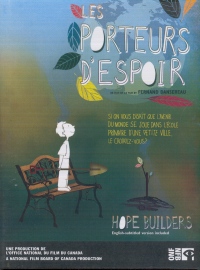| ________________
CM . . . . Volume XVIII Number 7 . . . . October 14, 2011
excerpt:
While there have been a small number of first-rate dramatic films about teaching, few documentaries filmed in classrooms exist. I have a copy of the much beloved Être et Avoir (To Be and to Have) released in 2002, but know of no others. This is one reason I accepted the offer to review Fernand Dansereau’s Les Porteurs d’Espoir. Another reason was the teaching portrayed in the film was focused on preparing one class of Grade 6 children “to take up environmental challenges.” With all that has been written about children and environmental education and education for sustainability, I must admit I was curious to see the “action research” approach promoted by Claude Poirier. Les Porteurs d’Espoir begins in the classroom of Dominique Leduc, known to his 24 students as Mr. Dominique. It’s late-September, early-October in McMasterville, Quebec, and the students are responding to the question, “Are you optimistic or pessimistic when it comes to your future and that of the environment?” When students have voted and explained their particular stance, Mr. Dominique continues his questioning by asking, “What does science mean to you?” Following a good response from Ti-Brin, he says, “We’re going to explore and carry out a scientific procedure. We’re going to choose something that bothers us in our environment, and we’re going to undertake a ‘research-action’ to solve a community problem.” Thus begins the action research and the students’ gradual identification of the environmental challenge they will spend the school year attempting to resolve.
Fernand Dansereau, his cinematographer Julien Fontaine, soundman Stéphane Barsalou, and crew have created an exceptional film. It portrays inquiry, experiential, and service learning with the clarity necessary for teachers to duplicate the approach in their classrooms, and this clarity comes by showing setbacks and frustrations alongside supports and successes. It’s an absolute joy to witness the teaching that enables and encourages students’ development of collaborative, communicative, and critical thinking skills that serve them well in garnering community support for their park renewal and anti-vandalism projects and will continue to serve them well throughout life. Highly Recommended. Barbara McMillan is a teacher educator and a professor of science education in the Faculty of Education, the University of Manitoba.
To comment
on this title or this review, send mail to cm@umanitoba.ca.
Copyright © the Manitoba Library Association. Reproduction for personal
use is permitted only if this copyright notice is maintained. Any
other reproduction is prohibited without permission.
NEXT REVIEW |
TABLE OF CONTENTS FOR THIS ISSUE
- October 14, 2011.
AUTHORS |
TITLES |
MEDIA REVIEWS |
PROFILES |
BACK ISSUES |
SEARCH |
CMARCHIVE |
HOME |
